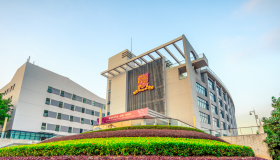【Master Forum】Nanotechnology and Precision Medicine
Topic:Nanotechnology and Precision Medicine
Speaker: Professor Shan Xiang Wang (Stanford University )
Date: September 12, 2016, Monday
Time: 16:30—17:30
Venue: Governing Board Meeting Room, Daoyuan Building
Language: English
Speaker Profile:
Dr. Wang is a Professor of Materials Science & Engineering and jointly Professor of Electrical Engineering at Stanford University, and by courtesy, a Professor of Radiology at Stanford School of Medicine. He directs the Center for Magnetic Nanotechnology, and is a co-Principal Investigator of the Center for Cancer Nanotechnology Excellence for Translational Diagnostics (CCNE-TD) at Stanford University. He has over 250 publications, and holds 53 issued or pending patents in the area of magnetic nanotechnology, biosensors, nanofabrication, spintronics, power management and information storage. He is a scientific founder of MagArray Inc. and serves on the advisory boards of Nvigen Inc. and several other companies. He is a Fellow of the Institute of Electrical and Electronics Engineers (IEEE) and a Fellow of American Physical Society (APS) for his seminal contributions to magnetic materials and nanosensors. He has been recognized by numerous other honors and awards, including an Inaugural Frederick Terman Fellowship, and a Distinguished Award in Nokia Sensing XCHALLENGE.
Abstract:
Nanotechnology is playing a critical role in emerging precision medicine (and precision health). For example, nanoparticle-based drug delivery is shown to boost efficacy of cancer therapies. In this lecture, I will introduce two magnetic nanotechnologies which my group has developed, and their killer applications.
A magnetic sifting technology based on using magnetic nanoparticles to tag circulating tumor cells (CTCs) in conjunction with magnetic filtration is developed to enable high-throughput enrichment of CTCs with release capability. For subsequent characterization, a robust nanowell-based assay is designed to circumvent experimental errors associated with ensemble measurements through detection of mRNA transcripts directly from single CTCs (using one-step RT-PCR). These massive single-cell arrays are able to isolate up to thousands of single lung cancer cells to measure gene expression at a given timepoint and to observe the time course of single cancer cells. The blood-based profiling of genetic mutation allows doctors to administer personalized precision medicine which can significantly raise the survival rate of cancer patients.
On another front, magneto-nanosensors based on magnetic nanoparticle (MNP) labeling of biomolecules (such as proteins and DNA) and giant-magnetoresistive sensors used in computer hard drives have gained great interests in nanotechnology and biomedicine community. The magneto-nanosensors are well-suited for medical diagnostics of diseases at early stages because they possess attomolar to femtomolar sensitivities for protein biomarkers. The technology platform has been applied to in vitro diagnostics of lung cancer, prostate cancer, liver cancer, autoimmunity, radiation exposure, hepatitis, and cannabis abuse. The magneto-nanosensors are being adapted for point of care settings, mobile health, and global health, and Qualcomm Tricorder XPRIZE competition.





